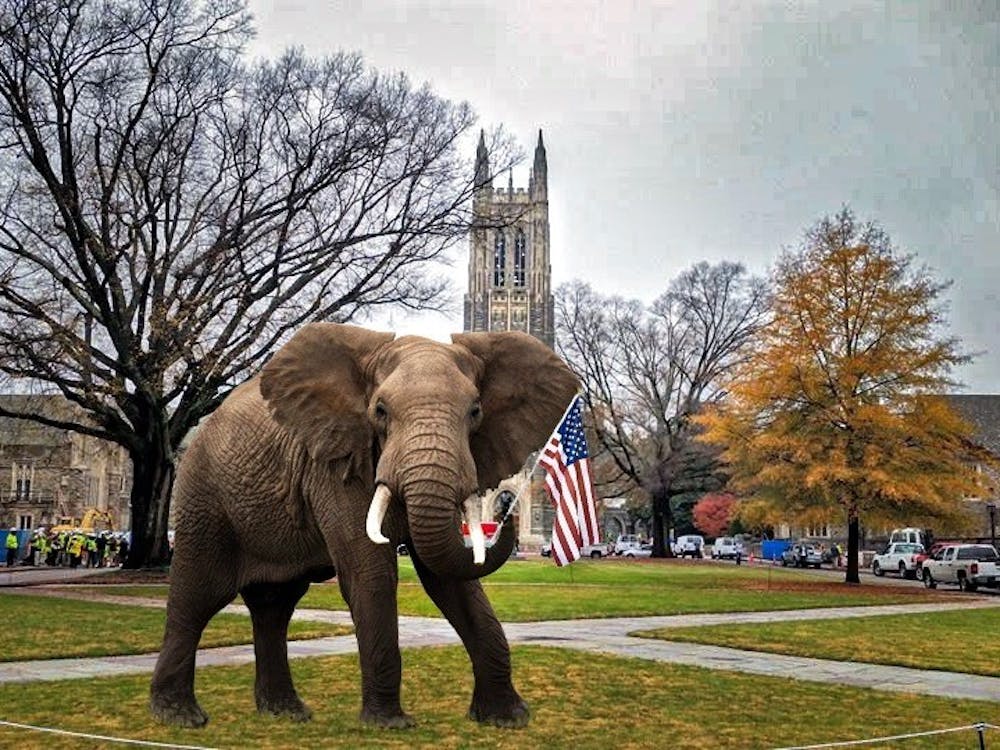For more election coverage from across North Carolina, visit One Vote N.C., a collaborative between The Chronicle and six other student newspapers that aims to help college students across the state navigate the November election.
With the election just weeks away, students have mobilized, campaigning for candidates, setting up voter registration tents and hosting debate watch parties over Zoom. But one group is conspicuously quiet: the Duke College Republicans.
The organization decided against rechartering this fall because of ideological tensions within the group and the broader Republican Party, said Karl Harrison, Trinity ’20 and a former member.
“We just couldn’t compromise,” said Harrison said.
Harrison described a split between fiscally conservative “Ben Shapiro types” and socially conservative students like himself. After the social conservatives assumed control of the College Republicans, the economic conservatives left, catalyzing the organization’s disintegration, he said.
Though College Republicans have temporarily disbanded, conservatives at Duke are still present.
“Generally… the consensus is that most [conservatives] are… not very vocal with their political beliefs,” said first-year Brendan Parrella, who identifies as Republican but is “more libertarian than pure conservative.”
He cited a fear of being “ostracized” as the main reason why conservative students don’t speak up about their views. He recalled a conversation with another right-leaning student who admitted to lying about his voting preferences to avoid jeopardizing friendships.
Though Parella said he tries not to come across as too partisan in political discussions, he also wishes there was more openness to bipartisan campus dialogue.
“There have definitely been situations where I’ve wanted to say something but have kind of restrained myself because I’m scared that it’ll be interpreted wrong,” he explained.
Harrison, on the other hand, described free speech as “readily available” on campus and said he never experienced any harassment during his time with the College Republicans. Yet he acknowledged an “air of dismissiveness” regarding the few active conservative students at Duke.
To Harrison, dismissal of Trump supporters echoes the sentiment of the country as a whole, where coastal Democrats tend to hold unfavorable views of the right-leaning “flyover parts of the country”—namely the South and Midwest.
“There’s a tendency to dismiss all these people as groups who are voting against their own interest,” Harrison said, referencing the concept of “somewheres versus anywheres” to convey the geographical divisions in American politics.
Asked to weigh in on the November election, Harrison depicted President Donald Trump as a “transition candidate”—a politician who is shifting the Republican Party further to the left on economic issues. He cited the Trump administration’s tariff policy and issuance of COVID-19 stimulus checks as evidence of the changing face of the party.
While Parrella wasn’t impressed with Trump’s response to the coronavirus pandemic, he also expressed approval for the administration’s economic policy—albeit for different reasons than Harrison. He described Trump’s economy as “laissez-faire,” which aligns with his libertarian views. Although he said Joe Biden “seems like a good guy,” he diverged sharply from the Democratic candidate’s policy views—particularly on social programs and healthcare.
Regarding voting in the election, Parrella remains undecided. Although he favors libertarian candidate Jo Jorgensen, he’s wary of supporting a third party in such a consequential election.
“I think my vote will count more if I do vote for one of the main parties,” he said.
Harrison added that the two parties are now more divided than ever, which makes it difficult to find common ground.
Parrella, who is “not a big fan” of Trump but hasn’t ruled out voting for him, said he has seen derogatory language directed towards Trump supporters on Duke students’ social media accounts.
“There’s a lot of negative attitude there,” he said.
Harrison described characterizations of Trump as racist, facist and xenophobic as a “red herring.” He expressed disappointment in extremist caricatures on both sides, which he thinks are unproductive.
Trump has been criticized for racist remarks, including telling four freshman congresswomen to “go back” to where they came from, and for immigration policies critics have said are xenophobic.
While Parrella said he couldn’t attest to the president’s personal character, he and Harrison agreed that it was unfair to assume Trump supporters hold prejudicial attitudes.
Parella noted that he didn’t think supporting or voting for Trump makes someone racist, as “people are voting for different reasons.”
For Harrison, the election is not only about the presidency, but also about who will shape the judicial and legislative branches. He highlighted the importance of Amy Coney Barrett's potential confirmation to the Supreme Court in a follow-up email to The Chronicle. The prospect of a “6-3 Catholic supermajority on the court is historic,” he wrote.
As for the fate of the College Republicans, Harrison said it rests in “the hands of… the underclassmen.”
Matthew Griffin contributed reporting.
Get The Chronicle straight to your inbox
Signup for our weekly newsletter. Cancel at any time.

